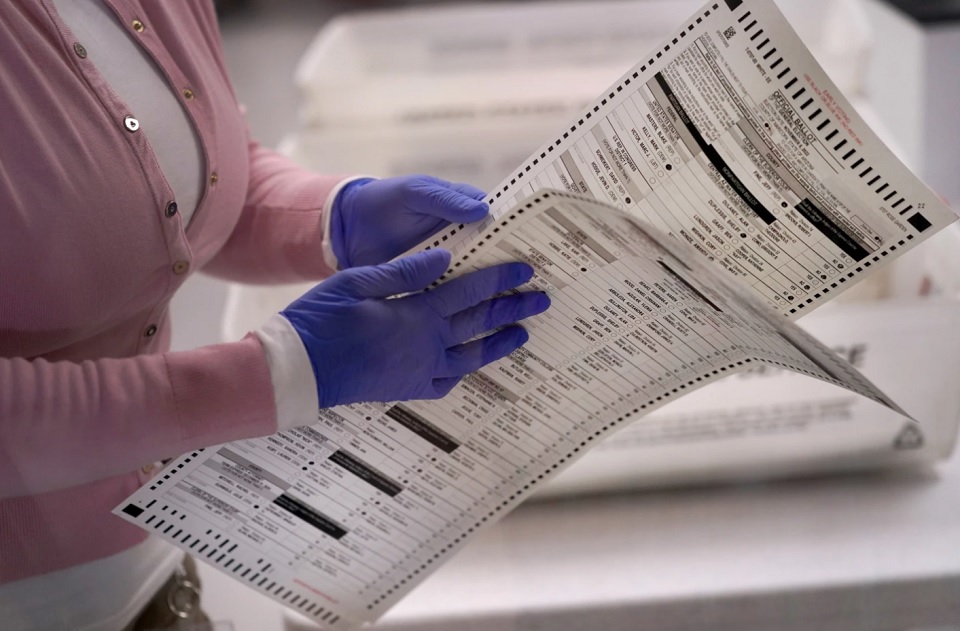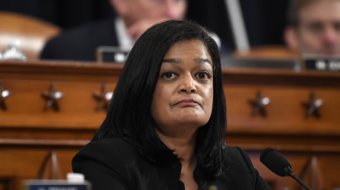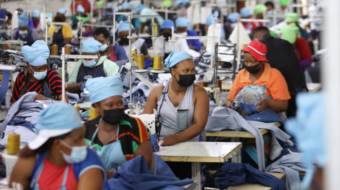
ST. LOUIS—How do you excite voters about an election 18 months in advance?
That’s the problem facing the labor movement as it mobilizes its troops all-out to re-elect Democratic President Joe Biden and Vice President Kamala Harris in November 2024.
After all, the old saw is voters don’t care about the presidential race until summer turns to fall of an election year—and often until after that year’s World Series is over. We’re far from then.
Union leaders gave varying answers when the AFL-CIO unveiled its earliest-ever endorsement of the ticket, back in Philadelphia in the spring. But those are leaders…How about the rank-and-file?
That’s the question People’s World posed to Communications Workers during their mid-July convention in the U.S. heartland, St. Louis, Mo. The answers were even more varied than they were in Philadelphia.
They also show unionists who follow the news, who are heavily involved, who are leaders, or all of the above, have their work cut out for themselves.
Some delegates view exciting voters, this far ahead of time, as an impossible task. Local 3204 retiree Ouida Collins, vice president of the Atlanta chapter of the Association of Retired Americans, rolled her eyes and looked at the ceiling. She didn’t say a word. She didn’t need to.
By contrast, Beverly Shelton of Local 7702 in Pueblo, Colo., tells people “The campaign’s already started.
“You got to start talking to people now. It (the election) will be here sooner than you think,” she says. “You can’t wait until August 2024.”
Anna Urban Chase, vice president of Local 6150 in Dallas, says motivating younger voters will be a problem, even though they’re the most likely to vote Democratic. “I constantly talk to my daughter: ‘Register, educate yourself, vote.’ But she and her friends aren’t interested in the news,” much less the political campaign. “All I can do is keep re-emphasizing it.”
Christa Hinojosa, a nurse and member of Local 7181, which straddles the Mississippi River in Iowa and northwestern Illinois, prefers asking voters questions on how they feel about candidates and issues. “Get a couple of yesses, and then follow up to meet with them—and keep meeting,” she says.
Gadi Israel, an AFA-CWA Local 24029 member from Milwaukee, and her friend, Doris Millard of AFA-CWA Local 24003 out of Chicago’s O’Hare Airport, agreed candidates must negotiate tricky issues and differing opinions in their efforts to reach voters.
One of the two is for reproductive choice, the other is not, for example. When the Supreme Court issued its Roe v Wade decision 50 years ago making abortion a constitutional right, “The scientific facts were different than they are today” as far as early birth goes. Yet Biden and the Democrats don’t seem to realize that, being reflexively pro-choice.
Millard said she’s wary of political promises. “It’s a huge money thing,” she says of candidates who must raise and spend millions to get elected. “They talk the talk but don’t walk the walk.”
One of the two worked in marketing before switching careers, and she says that’s where unions—and Democrats—lag behind their corporate and political foes.
“Slogans are effective. ‘Higher pay—no delay’ works, like the commercials I remember as a kid. Find the sweet spot and use it, but not too much to numb people. That’s irritating.
“And don’t be wishy-washy,” she warned. Even if the candidate disagrees with your views, a consistent candidate will win voters’ respect.
“The most important thing is to build a strong network of education, trust, and involvement” with members, says Sylvia Ramos of Telecom Local 6143 in San Antonio, Texas. “To get the same message out, we must get our own house in order.”
Some unionists face the problem of motivating voters in a deep-red area. Jim Sutter, president of Local 2101 in Queen Anne’s County, Md., says his “problem is finding qualified candidates” to run. “In Queen Anne’s County, there aren’t any.” His solution: Work with local Republicans, one by one, to at least neutralize their party’s anti-worker dogma. “I keep up relationships with them in hopes of getting them to listen.”
Chuck Rooney, president of CWA local in Virginia’s heavily Republican South Side, encounters cynics. “What’s he (Biden) done for us?” they ask. Many, he says, “are single-issue voters and right now their issue is immigration. Before, it was gays, but that’s faded.” Both are social issues Republicans are riding, especially migration across the U.S.-Mexico border.
Ramos adds that truth from office-seekers matters: “We need to elect candidates who support working people—and who don’t talk out of both sides of their mouths.”
Rick Poulette, the retiring and longtime president of CWA Local 3181 in West Palm Beach, Fla., says you must start with the bottom of the ticket, not the top, and make sure your people get out to vote—because the other side is expert at that.
“If you want change, get out there!” he emphatically declares. “Democrats don’t” vote in many elections. They did in 2008, “But when (Barack) Obama got elected” president, “they got comfortable.”
The result was a wipeout up and down the ballot two years later.
“Everybody has to get out and educate everyone, one-on-one,” he urges. Pamphlets and flyers won’t work, he contends, because “people throw ’em in the trash.”
Messaging matters, too, a point Poulette and the two AFA-CWA members agree upon. The Republicans have honed their messages into simple slogans “but I don’t think the Democrats have a simple message right now. They have to pound a message right back.
“And tell people what you’ll lose if you don’t vote,” he adds, pointing to the anti-worker legislation right-wing Republican Gov. Ron DeSantis and his legislative followers have enacted.
Though he’s not part of the rank-and-file anymore, new CWA President Claude Cummings has his own ideas—specifically creating a mass coalition—for getting people involved this far ahead of the election.
“One thing I plan to do is bring every civil rights organization in to talk about creating a well-designed plan—not just giving money—for get-out-the-vote efforts,” he told the convention. “We’re going to run an aggressive independent expenditure campaign and create a program like we’ve never seen before.”
Issues appeal to Local 2108 retiree Icy Barton of Beltsville, Md., who used union scholarship benefits to put herself through college, a master’s degree, and a Ph.D. “As an African American, I still need a law to make sure I can vote,” the Army veteran says of the Voting Rights Act. The Republican-named U.S. Supreme Court majority emasculated the VRA several years ago.
She tells younger still-working voters that “someday you’ll need benefits” the union brings, too, particularly health care coverage. Between her union health insurance and her military coverage, insulin is free, Barton says. Otherwise, it would cost her $1200 a month. Biden just jammed a law through Congress reducing insulin payments by seniors to $35 monthly.
“I tell people ‘Your vote does make a difference,’” including in the fight against bigotry, said fellow Local 2108 retiree Calvin Foster. Foster, another veteran, believes that will be a key theme next year. His message: “Not every African American or Latino is taking away a (job) slot from a Caucasian.”
Poulette’s example of what happens if you don’t vote is not the presidency or the 2000 Florida race for that job, featuring the “hanging chads” of Palm Beach. Poulette was part of that count.
He cites the last local school board race in what is usually solidly Democratic Palm Beach County. The board was 6-1 Democratic going into the election, Poulette remembers. But the Democrats didn’t vote while the Republicans did—and the board flipped to 5-2 GOP. Each race was won or lost by a handful of votes. Anti-teacher decisions and social issue emphasis has been predictable.
That happened all over Florida, up and down the ballot. In 2010, Republicans won the governorship, took control of the legislature, and have cemented it since then, emphasizing anti-worker and anti-school legislation. In other words, social issues. The fallout’s even filtered down to the local level, and shouldn’t have, Poulette adds.
“When you vote, you win,” says Poulette. “If you choose not to vote, you cannot talk to me,” adds Barton. “Because then what you’re saying is que será, será.”
We hope you appreciated this article. At People’s World, we believe news and information should be free and accessible to all, but we need your help. Our journalism is free of corporate influence and paywalls because we are totally reader-supported. Only you, our readers and supporters, make this possible. If you enjoy reading People’s World and the stories we bring you, please support our work by donating or becoming a monthly sustainer today. Thank you!










